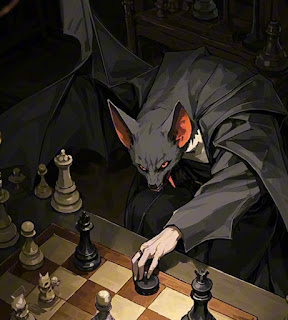Don't Delay: The Power of Quick Development in Chess
The air in the backroom of "Bat'sLife" chess club was always thick with the scent of old wood, stale coffee, and unspoken ambition. Tonight, however, there was an added current of anticipation. A hush fell over the usual clatter as a figure emerged from the shadows near the dusty bookshelf. They called him Bat, though no one knew his real name, nor had anyone ever seen him play a game. He was a recluse, a whisper, a persistent rumor of a chess master whose understanding of the game was almost supernatural.
 Bat’sLife appearance was as indistinct as his past. Dressed in a dark, shapeless coat that seemed to absorb the dim light, his face was obscured by the brim of a wide-brimmed hat, casting his features into perpetual twilight. Only a faint gleam from what might have been spectacles hinted at eyes within. He moved with a quiet dignity, settling onto the stool beside the demonstration board, a worn chess set already meticulously arranged.
Bat’sLife appearance was as indistinct as his past. Dressed in a dark, shapeless coat that seemed to absorb the dim light, his face was obscured by the brim of a wide-brimmed hat, casting his features into perpetual twilight. Only a faint gleam from what might have been spectacles hinted at eyes within. He moved with a quiet dignity, settling onto the stool beside the demonstration board, a worn chess set already meticulously arranged.
"Tonight," Bat'sLife voice was a low, resonant rumble, surprisingly clear in the hushed room, "we speak of rapid development."
A few younger players exchanged glances, suppressing a snicker. Development, they thought, was basic. But as Bat'sLife began to speak, the simplicity of his words belied the profound depth of his insight.
"Consider the opening," he began, his hand hovering over the board but never touching. "A nascent war. Each piece, a soldier. To leave them languishing on their starting squares, to move the same pawn twice, or to dally with unnecessary queen sorties in the early stages… this is to send your army to battle with half its forces still in the barracks."
He gestured vaguely towards the king's side. "Your knights should leap forth, surveying the central squares, controlling vital outposts. They are the cavalry, quick to flank, quick to defend." He paused, and a subtle shift in the room's atmosphere suggested the listeners were no longer just hearing, but seeing. "And your bishops! Their diagonals are highways, paths to distant threats and opportunities. To keep them hemmed in, blocked by your own pawns, is to blind yourself to half the board."
Bat'sLife discourse wasn't a dry lecture; it was almost a performance. He spoke of the center not just as a few squares, but as the heart of the battlefield, the nexus of power. "He who controls the center," he intoned, "controls the tempo. And how do you seize the center? With pawns, yes, but more importantly, with the active presence of your developed pieces, supporting those pawns, exerting influence."
He moved to the king safety aspect, a gentle warning in his voice. "Development is not merely about bringing pieces out. It is about bringing them out to purposeful squares, to positions where they defend, attack, and prepare for the next phase. And central to this, gentlemen, is the safety of your king. Castling, swift and decisive, is not merely a move; it is an act of fortification, a declaration that your monarch is secure, ready to command from behind a wall of pawns."
One young, brash player, emboldened by a recent tournament win, piped up, "But what about gambits, Master Bat'sLife? Sacrificing development for attack?"
Bat’sLife head tilted slightly, and for a moment, the brim of his hat seemed to dip, casting his face into even deeper shadow. "A gambit, young one," he replied, his voice still low but with a newfound edge, "is a calculated risk, a temporary deficit in material for a permanent advantage in development and initiative. But to sacrifice development without a clear, decisive plan to exploit that lead... that is not courage, that is folly."
He leaned forward slightly, his hands resting on the edge of the board, though still not touching the pieces. "Remember this principle: every move should develop a piece, support a developed piece, or improve the position of an already developed piece. If a move does none of these things, question its wisdom. For in the early game, time is not measured in seconds, but in the activation of your forces. The player who brings their army to bear first, with purpose and coordination, will often dictate the flow of the battle, regardless of initial material balance."
As he finished, the silence in the room was profound. No one clattered their coffee cups, no one shifted impatiently. They were all, for a fleeting moment, still under the spell of Bat'sLife enigmatic wisdom. He rose as quietly as he had appeared, melting back into the shadows near the bookshelf. The light in the room seemed to brighten almost imperceptibly, as if the darkness he carried had lifted.
The players, however, remained. They began to move the pieces on their own boards, not with the usual frantic energy, but with a new, contemplative deliberateness. The whisper of Bat's words echoed in their minds: Rapid development. Purposeful squares. Time as activation. And as the first few pawns advanced, followed by the swift deployment of knights and bishops, the game of chess began to transform, one rapidly developed piece at a time.


Comments